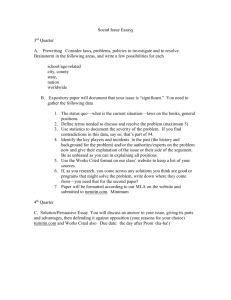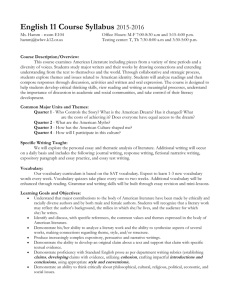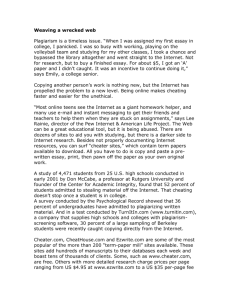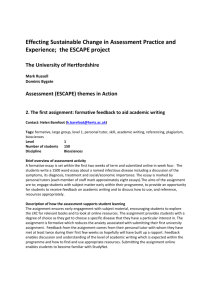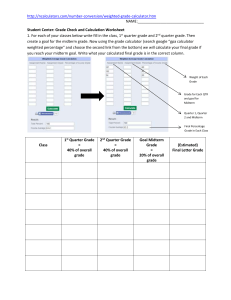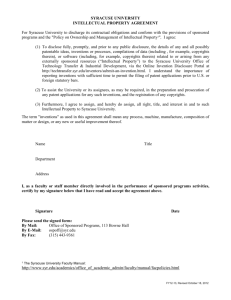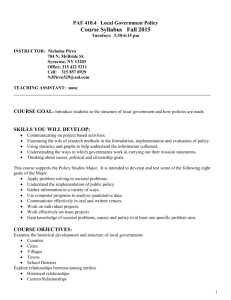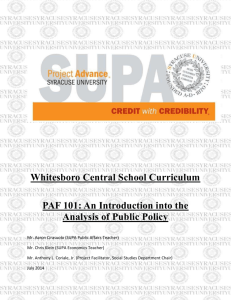SUPA American History 102 The United States Since 1865
advertisement
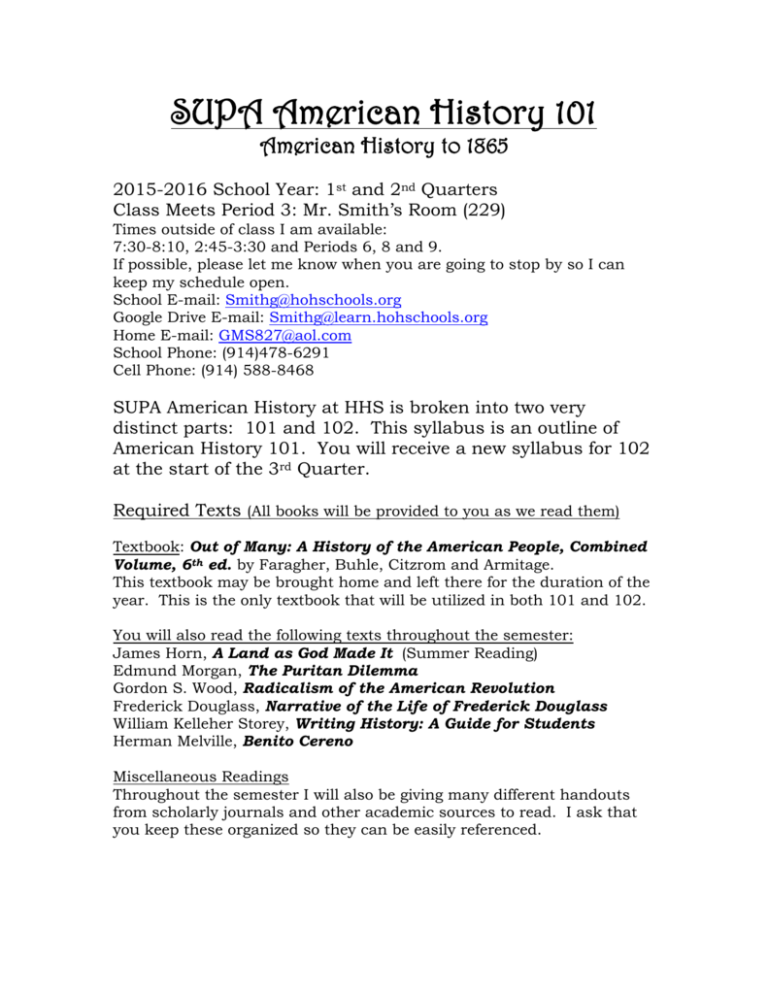
SUPA American History 101 American History to 1865 2015-2016 School Year: 1st and 2nd Quarters Class Meets Period 3: Mr. Smith’s Room (229) Times outside of class I am available: 7:30-8:10, 2:45-3:30 and Periods 6, 8 and 9. If possible, please let me know when you are going to stop by so I can keep my schedule open. School E-mail: Smithg@hohschools.org Google Drive E-mail: Smithg@learn.hohschools.org Home E-mail: GMS827@aol.com School Phone: (914)478-6291 Cell Phone: (914) 588-8468 SUPA American History at HHS is broken into two very distinct parts: 101 and 102. This syllabus is an outline of American History 101. You will receive a new syllabus for 102 at the start of the 3rd Quarter. Required Texts (All books will be provided to you as we read them) Textbook: Out of Many: A History of the American People, Combined Volume, 6th ed. by Faragher, Buhle, Citzrom and Armitage. This textbook may be brought home and left there for the duration of the year. This is the only textbook that will be utilized in both 101 and 102. You will also read the following texts throughout the semester: James Horn, A Land as God Made It (Summer Reading) Edmund Morgan, The Puritan Dilemma Gordon S. Wood, Radicalism of the American Revolution Frederick Douglass, Narrative of the Life of Frederick Douglass William Kelleher Storey, Writing History: A Guide for Students Herman Melville, Benito Cereno Miscellaneous Readings Throughout the semester I will also be giving many different handouts from scholarly journals and other academic sources to read. I ask that you keep these organized so they can be easily referenced. 2 Course Description While this course is an “introductory” course in American history covering the period from 1607 to 1865, it is not a “survey” course in the sense that we will not attempt to discuss every fact or cover every event in 250 years of American history. Rather we will approach this period of history through the discussion of three themes. The first, essentially covering the period from the “founding” down to the middle of the eighteenth century, will deal with the question on how Europeans from a medieval culture became Americans. The second theme will explore the political, social and economic impact the Revolution had upon American Society. And finally, we will focus on the modernization of American society in the nineteenth century and examine the relationship between modernization and the sectional crisis. In all three themes we will focus, in part at least, on issues of political democracy, social justice and equality. This course has two fundamental objectives. First we will study history as a process through which our society and our country came to be as it is today. This course is not concerned with minor facts and memorization, but rather with seeing the big picture. Second, this course will challenge you to develop your critical thinking, reading and writing skills. I will introduce you to sets of complex historical problems and ask you to order, assess, analyze, and conceptualize material in order to gain greater understanding of the particular problem with all it larger ramifications. And yes, we will be covering material that will be on your Regents examination in June, but do not even think of that test until the Spring! How the Course Works The schedule posted on our School Wires page will indicate daily reading assignments and paper dates. I will try my best not to alter due dates and assignments, and will always inform you of any changes during class. I will always post what is due on the day it is listed. Each day time will be spent on lectures, activities and analysis of the books we will be reading. It is of extreme importance to keep current with ALL of the assigned reading and stay abreast of all due dates. Tests You will have one essay test at the end of the First Quarter, which will be considered your midterm and one final essay test at the end of the Second Quarter which will be considered your final examination. In addition you will have a series of announced quizzes throughout the semester. 3 Papers There will be three papers for this course. All papers are due by 8:10 AM on their respective due date. The first paper (2-3 pages) will be a brief essay assessing and synthesizing what you gave garnered from Horn’s book. This will give me a chance to provide insights and feedback before too much of the term has passed. It is Due: Friday September 11th or Wednesday September 16th. The second paper (5-6 pages) will be a critical analysis of a theme introduced in Wood’s book. You will be asked to assess specific primary documents in your paper. It is Due: Friday October 22nd. The third paper (5-6 pages) will focus on a theme relating to the emerging sectional conflict in the years preceding the Civil War. Again, you will be asked to assess specific primary documents in your paper It is Due: Friday January 15th. * Please note that you must save all of your papers in both SUPA 101 and 102. Sometime during the fourth quarter I will be asking you to turn in your folder with all of your old papers.* Deadlines and Extensions To forestall problems and misunderstandings later on, here is the policy: Since you are receiving paper due dates and exam times at the beginning of the term, it is assumed that you will plan accordingly, and will consider potential conflicts with other courses and extracurricular commitments. Therefore, extensions will be granted only in extraordinary or emergency circumstances, and (except in dire emergencies) only if specific circumstances are explained to me in advance. Grades on papers that are turned in after the due date (without prior permission) will automatically be lowered FIVE points for everyday it is late (up to 15 points). No unexcused late papers will be accepted more than three days after the original due date. Similarly, if you absolutely cannot take the midterm or final on the scheduled date, please make arrangements with me well before its date. If you have an accident, or are suddenly ill, etc., and cannot make advance provision, you must present written explanation, signed by either physician or a parent. It is hoped that this covers all contingencies, and that it helps to have things in writing. 4 Plagiarism, Cheating, Academic Integrity and Turnitin Cheating on exams or plagiarizing on papers will result in your failing this course and a letter to Syracuse University reporting your conduct. Please note the following statement from Syracuse University: “Syracuse University sets high standards for academic integrity. Those standards are supported and enforced by your instructor, SU faculty and Project Advance administrators. The presumptive sanction for a first offense is course failure (SU grade of F), accompanied by the transcript notation ‘Violation of the Academic Integrity Policy.’ Students should review the Office of Academic Integrity online resource “Twenty Questions and Answers About the Syracuse University Academic Integrity Policy” and confer with your instructor(s) about course-specific citation methods, permitted collaboration (if any), and rules for examinations. The Policy also governs the veracity of signatures on attendance sheets and other verification of participation in class activities. Additional guidance for students can be found in the Office of Academic Integrity resource: ‘What does academic integrity mean?’” Hastings High School also imposes additional penalties for any violations concerning plagiarism. Please note pp. 50 and 51 of the Hastings High School Handbook that discusses “Academic Integrity” and “Plagiarism.” Here are some related SU links: Academic Integrity Policy: http://academicintegrity.syr.edu/academic-integrity-policy/ Twenty Questions and Answers about the Academic Integrity Policy http://academicintegrity.syr.edu/faculty-resources/ What does academic integrity mean? http://academicintegrity.syr.edu/what-does-academic-integrity-mean/ This class will also be periodically using Turnitin, a plagiarism prevention system. The ease of using the Internet has made it very easy for students to “cut and paste” material into papers that they are writing without proper citation. I will submit all/some/ papers that you write in this class to Turnitin, a service that identifies “matched text.” I will then interpret the originality report, based on your writing capability and writing style. In this class, you will also be given the opportunity to submit your own papers to Turnitin to check that all sources you have used are properly acknowledged and cited. Note that all submitted papers will be included as source documents in the Turnitin.com reference database, solely for the purpose of detecting plagiarism of such papers. 5 Grades The relative weight of each component of this course is as follows. In addition, extraordinary performance (good or bad!) in one or more area will be considered--especially in borderline cases. First Quarter Paper I (Introductory Essay)----------------------------------------5% Paper II (Revolution Analysis)--------------------------------------20% Midterm Exam--------------------------------------------- ----------25% Class quizzes and reflection papers------------------------------ 25% Class Activities-------------------------------------------------------25% Total------------------------------------------------------------------- 100% Second Quarter Paper III (Sectionalism Essay)-------------------------------------25% Class quizzes and reflection papers------------------------------25% Class Activities------------------------------------------------------ 25% Final Exam-----------------------------------------------------------25% Total------------------------------------------------------------------ 100% Final Average: Your grade that will be submitted to Syracuse University will be the average of your 1st and 2nd Quarters converted into a letter grade. All grades throughout the semester will be numerical, but your Syracuse grade will be a letter grade. (Please see conversion chart below.) It is also my policy to add FIVE percent to your quarter average for your HHS transcript to compensate for the fact that you are taking a college course that is far more rigorous than a traditional class in the High School. (HHS grade not to exceed 99%) Your final High School Average will be an average of your four quarters (90%) and the Regents Examination (10%). Grade Conversion A (96-100) A- (90-95) B+ (87-89) B (83-86) B- (80-82) C+ (77-79) C (73-76) C- (70-72) D (65-69) F (64 or below)
